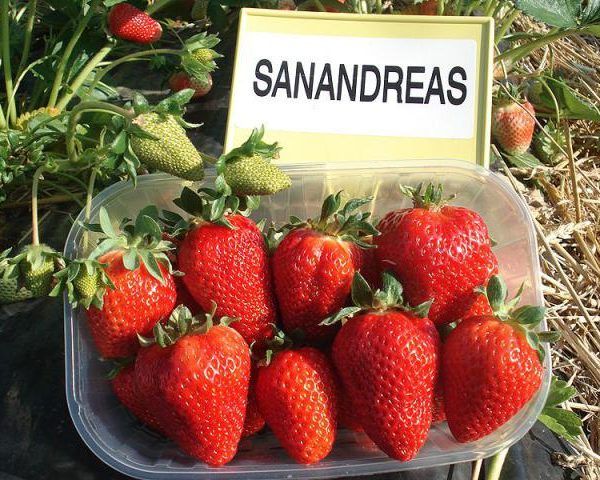Strawberry San Andreas is a remontant strawberry of a neutral day time, that is, it is constantly tied up and bears fruit.
Table of contents
Description of the variety
Strawberries are bred by Californian breeders in the Wolfskill experimental garden of Albion and Cal 97.86-1 varieties around 2002. Berries are formed, from May to October.
But it is sufficiently frost-resistant, only in Siberia it will not grow.
Characteristics of berries
For the season with one bush collected 0.5—1 kg of berries. Scarlet berries glisten, they are dense, firm. To taste they are the sweetest with some sourness. They are slightly oblong in shape, their tips are slightly rounded.
If the berry is cut, then the flesh is orange-colored. Berries weigh, on average, 30–35 g, but fruits weighing 50 g grow as well. Tails of strawberries are very strong. Seeds are small, they are slightly pressed into the flesh.
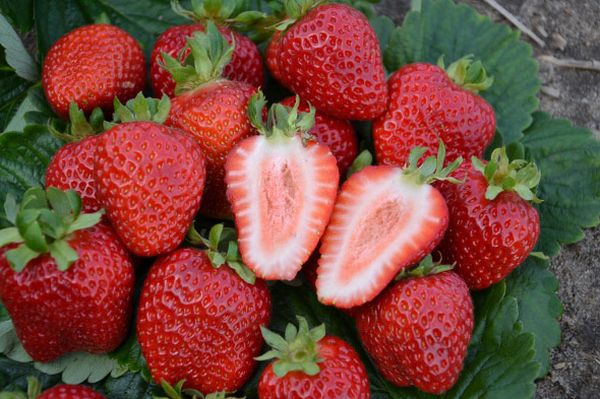
Characteristics of the bush
The bushes are medium in height, their leaves are light green. Whiskers in the bushes formed a little. On one bush grows to 10 inflorescences.
Advantages:
- Large berries, commodity in appearance.
- The bushes are resistant to gray rot, anthracnose and weather changes.
- Long fruiting time, from May to October. High yields.
- Berry transportable, she well preserved.
Disadvantages:
- The shrubs of the remontant strawberry need to be changed frequently, since with such an intense setting of berries, they quickly become shallow.Recommend planting new bushes in 3-4 years.
- Bushes require constant care.
- They can attack aphid and strawberry mite.
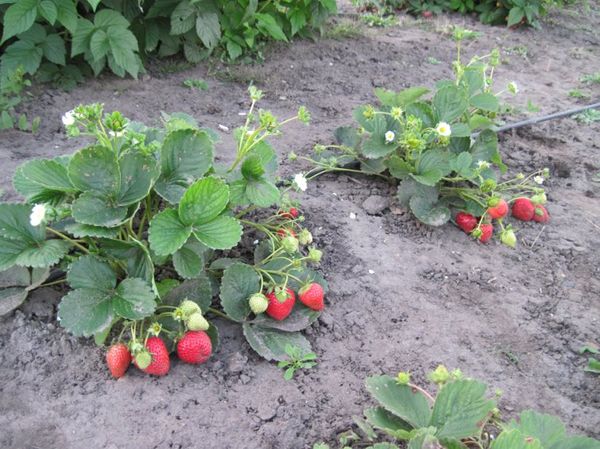
Planting and cultivation
Selection of land for landing
It is better to grow on the spot where marigolds, parsley, radishes, peas, beets, beans, carrots, garlic, mustard were planted. And after the nightshade, cucumbers, raspberries and cabbage, this type of strawberries are not recommended for planting.
How to prepare the soil
If you plan to plant strawberries in the spring, then cook the land in the fall, and if in the fall, then prepare the soil in the spring. Place a bucket of humus, rotted manure or compost, 5 kg of ash per 1 m² of land. Dig up the ground with a fork, remove the weeds.
A month before planting, pour in 20 g of potassium sulfate and 40 g of superphosphate per 1 m², or 1 tbsp. a spoonful of the drug Kaliyfos, re-dig the earth again.
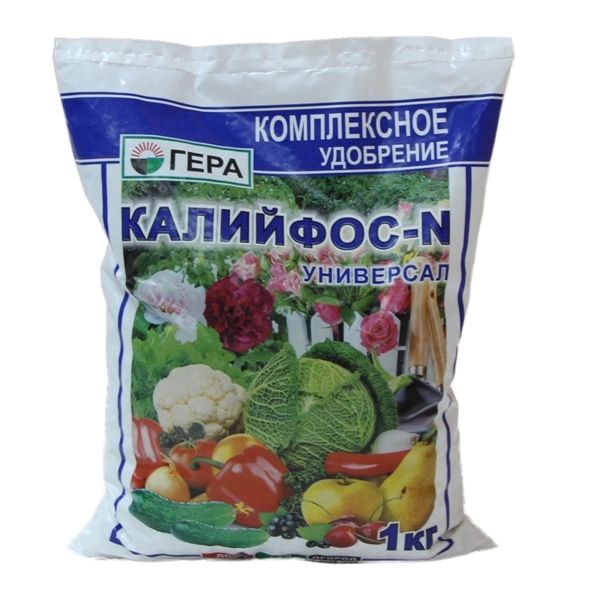
What month is seedlings planted
Planted since May 15, when there is no risk of spring frosts.If you plant in the fall, then do it from August 15 to September 30.
How to plant
Between seedlings indent into 25-30 cm, and between rows keep distance - 70 cm.
Choose a day without sun and rain, dig holes, pour water there and put a seedling. When you fill the ground, make sure that the roots are not bent, and the hearts were located slightly above ground level. Water down the landing.
The subtleties of growing strawberry San Andreas
If you planted strawberries in the spring, then sprinkle mulch from straw, pine needles, peat on top, or cover with black agroform, cutting holes for the bushes.
In the first year after disembarkation, the bushes do not feed, as they need only the fertilizers that you made when digging the ground. If you dropped them last year, then early spring cut off the old yellowed leaves and fertilize the earth with ammonium nitrate. By May 30, fertilizing repeat.
Water the strawberries, pluck the weeds, shallow the ground around deeply.
Remontant strawberries are watered even more often than usual, do it early in the morning or late in the evening. For watering use warm water.
Immediately after the landing, young bushes are watered every day, and after a week they begin to water once every 2-4 days.The bushes that you planted last year start watering at the end of April, if there is not a lot of melt water in the spring.
May and June watering 3-4 times a month, and from August to September 2 times a month. The ground should be 2-3 cm wet. On the next day after rain or watering, you will grieve the earth.
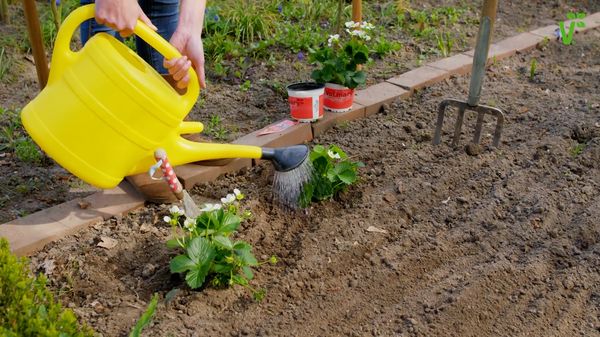
Breeding methods of reparative strawberries
Usa
When collecting berries for the first time, mark the best bushes, place their first antennae in the furrows that dig through the sides of the beds, cut off the remaining mustache.
Wait for the sockets on the mustache to grow and mature. Only then separate them from the parent bush and transplant.
Dividing bush
Since San Andreas forms a few whiskers, you can divide the most powerful bushes that are 2-4 years old. Early in spring or autumn, dig out the planned bushes, carefully divide them into the horns, then plant them in a new place.
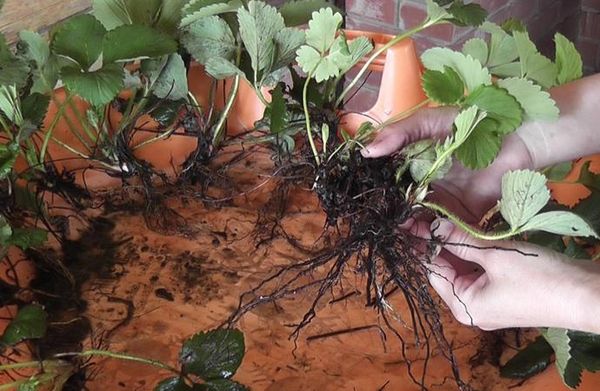
Diseases and pests
It has high resistance to anthracnose and gray rot. But she can get sick powdery mildew. In this case, the leaves curl, turn brown. Dig out diseased plants and eliminate them, but not diseased ones, treat with a weak solution of colloidal sulfur or potassium permanganate.
Leaves may also appear. brown spotthen they turn brown and then fall off. To eliminate the disease in early spring, process strawberries with copper oxide.
San Andreas is often attacked strawberry mitesThey feed on the sap of plants. Then the leaves turn yellow and curl, and the bushes cease to grow and develop. To protect it is very late in the fall, when all the berries are torn off, sprinkle the leaves with Carbofos.
On the strawberry San Andreas also appears aphid. To eliminate the colony of pests, pour strawberries with the solution of ash and laundry soap.
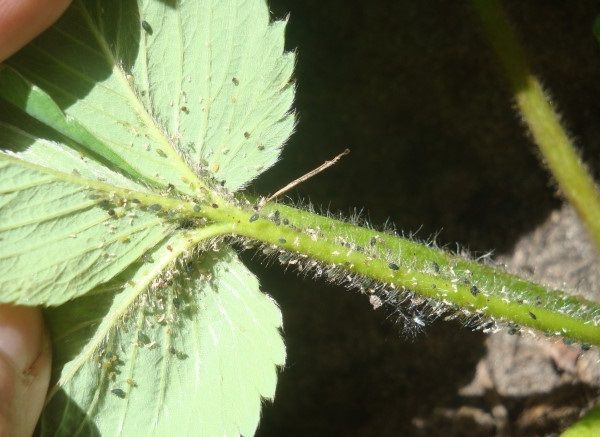
To prevent the appearance of fungal diseases and pest attacks, you can try to prepare the composition of:
- 2 tbsp. spoons of ash;
- 10 liters of water;
- 3 tbsp. spoons of over-cooked sunflower oil;
- 2 tbsp. spoons of vinegar (9%);
- 2 glasses of liquid soap.
Mix all ingredients thoroughly as described and process the plants and the ground beneath them.
Strawberry San Andreas is a very tasty sweet berry with a slight sourness, but the bushes must be carefully and continuously looked after.
